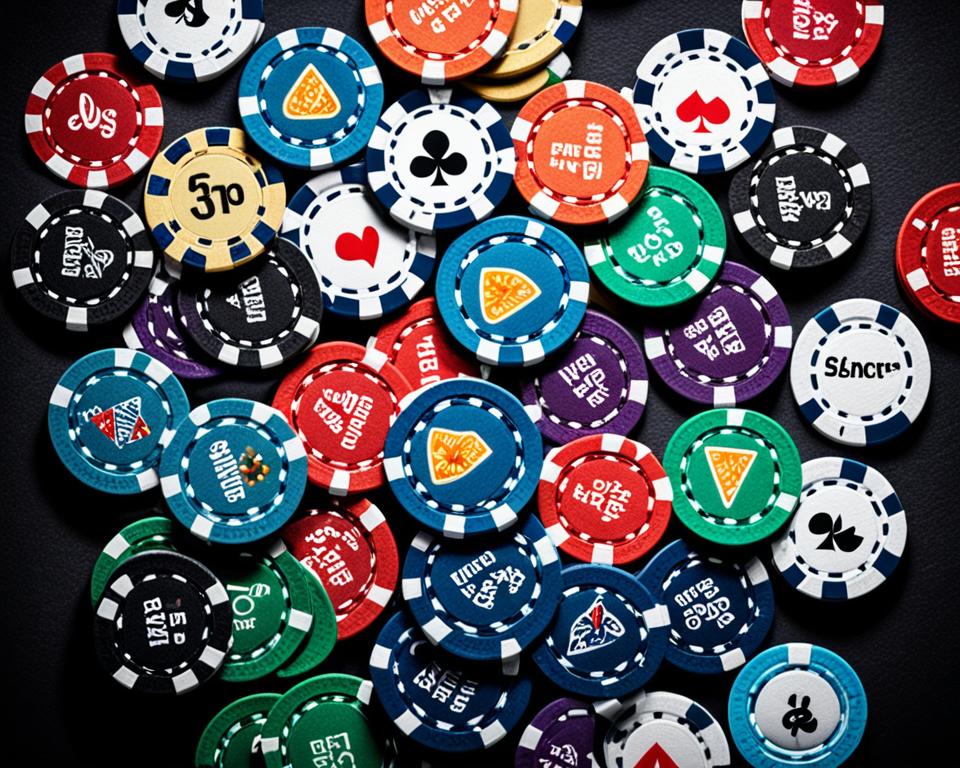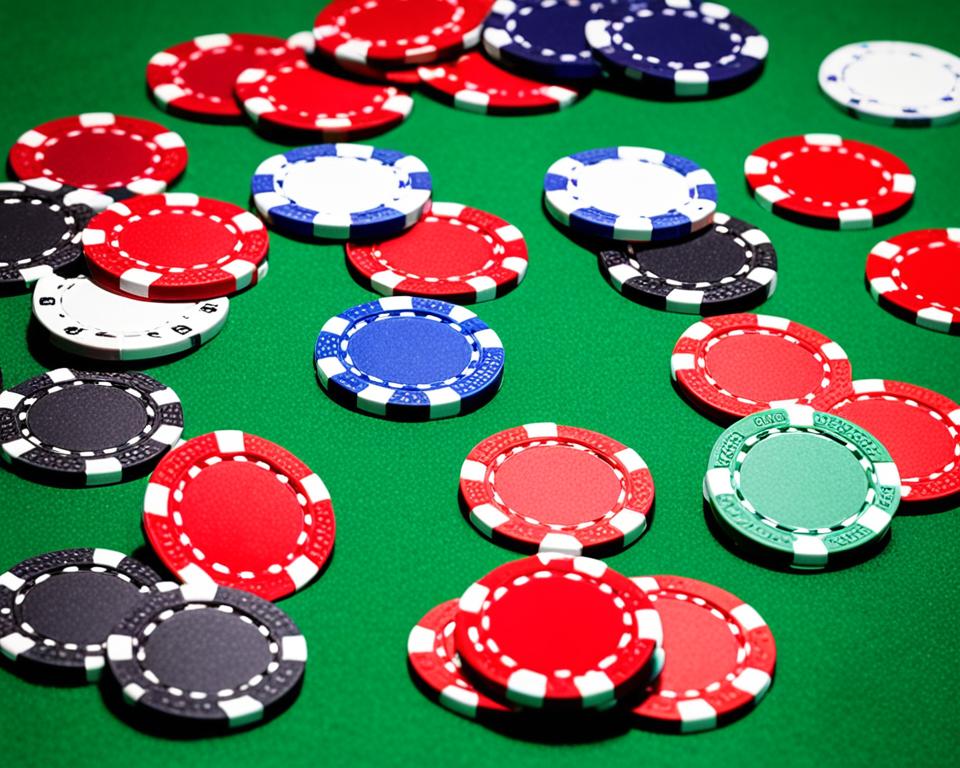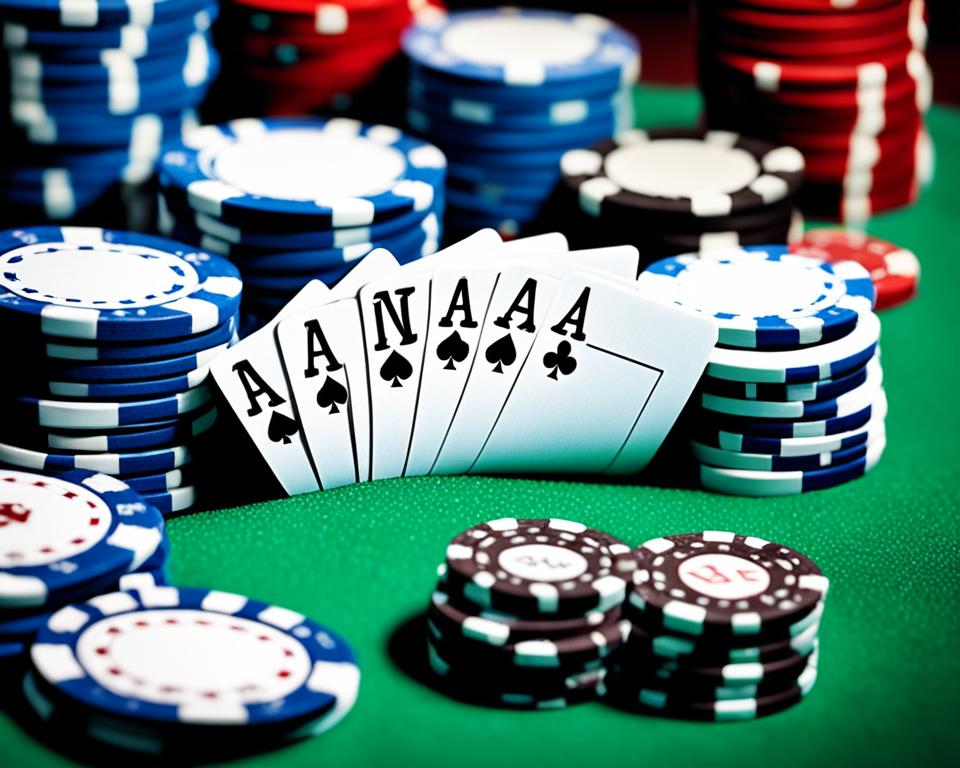
If you’re into poker, you know starting with the right number of chips matters a lot. This guide will explore how many poker chips you get at the start. We will cover this for different games, like tournaments and cash games.
We will look at why starting stack sizes vary and the standard chip denominations. Plus, we will talk about managing your chips properly. You’ll also get advice on protecting your chip stack and getting ready for your game, no matter your skill level.
By the time you finish this guide, you’ll understand the poker chip landscape quite well. This includes knowing about chip values and colors, handling your money wisely, and navigating the nuances of tournament chip structures. It’s time to learn about poker chip strategies!
Understanding Poker Chip Denominations
Poker chips are varied in colors and materials. Each type has a unique poker chip denomination and poker chip value. Knowing the poker chip colors and their values is key. It helps in managing your chip stack well in poker games.
Common Chip Colors and Values
Here are the usual poker chip colors and poker chip values:
- White chips: Often used for lower values, like $1 or $5
- Red chips: Usual values are $5 or $10
- Blue chips: Valued around $10 or $25
- Green chips: Typically stand for $25 or $100
- Black chips: The highest value, from $100 to $500
Identifying Chip Materials
No two poker chips are the same. They are made from various poker chip materials. Each material has its own pros. The main poker chip materials are:
- Clay chips: Mix of clay and resin. They’re sturdy, heavy, and make a unique sound.
- Ceramic chips: Smooth and look sleek. They are ideal for premium poker games.
- Plastic chips: Light and cheaper. Great for fun games at home.

Determining Starting Stack Size
How many poker chips you start with changes for poker cash games and poker tournaments. Knowing this helps with good poker bankroll management.
Cash Games vs. Tournaments
In poker cash games, you start with more chips, around 100 to 200 big blinds. This gives you room to move and bet. In cash games, you aim to keep and increase your chips throughout.
Yet, poker tournaments start you off with fewer chips, just 20 to 30 big blinds. It makes the game quick and challenging. You must play smart to grow your stack and handle the blind levels rising. Doing well in tournaments needs sharp poker bankroll management.
Bankroll Management Strategies
For both poker cash games and poker tournaments, good bankroll management is key to win over time. You need to watch your chips, bet smart, and plan for wins and losses.
Understand starting stack sizes across poker games and use the right bankroll management. This way, you can boost your success and find more joy in playing poker.

Factors Influencing Starting Chip Count
In poker, the amount of chips you begin with shapes your game plan and strategy. The starting chip count is affected by the poker buy-in, blind levels, and the skill level of the players. These aspects play a big role in your poker game.
Buy-in Level
The buy-in level mainly decides how many chips you start with. Basically, more expensive games offer more chips to start, and cheaper ones give fewer. Knowing this helps you manage your funds better and adjust your playing style.
Blind Levels
The poker blind levels design can change your chip count too. In tournaments, blinds go up over time. Over time, this can take a toll on smaller stacks. Players need to deal with these rising blinds wisely to keep their chip count healthy.
Player Expertise
Player expertise affects starting chip counts as well. Skilled player games may have more chips at the start. This is to match the intense gameplay. On the other hand, games with newer players might start with fewer chips. This makes the game more fun and accessible for everyone.
Understanding these aspects gives you a better chance at poker. It helps you shape a smart game plan and make decisions that improve your success rate at the table.
how many poker chips do you start with
When you begin a game of poker, the number of chips matters a lot. It affects how you play and what strategies you use. The amount of chips you get at the start is different for cash games and tournaments. This makes it important to manage your money well and try to win more often.
Standard Starting Stacks
In a cash game, players usually start with 20 to 100 times the big blind. If the big blind is $1, players might start with $20 to $100 in chips. The actual amount of chips can vary based on the rules and the betting limits.
Tournaments, however, give players much more to start with. The standard start stacks in these events can be 10,000 to 30,000 chips. How many chips you get depends on the type of tournament and how much it costs to join.
Adjusting for Tournament Formats
Tournaments have their own rules. For example, in a freezeout tournament, where you’re out if you lose all your chips, starting with more chips can let players make smarter moves. In a rebuy tournament, you might start with fewer chips because you can buy more early on.
Satellite tournaments give out even fewer chips at the start. They are a way to qualify for bigger tournaments. Having fewer chips in these events makes the game more intense and challenging.
Chip Distribution Strategies
Getting your poker chip distribution right is key to good chip management. This leads to keeping a good stack and playing well. We’ll talk about the best ways to give out, use, and keep your chips well-organized.
Effective Color Distribution
Sorting your poker chips by color can help you keep track easily. Divide them by how much they’re worth to know your total easily. This helps you decide on your bets, raises, or when to fold. It’s vital for your chips to match the game’s needs. Also, place the higher-value chips where they can be used easily and wisely.
Chip Value Ratios
It’s crucial to keep the right chip value ratios for good stack management. You should have chips in different values so you can bet smartly. Make sure you can make bets and raises of all sizes. This way, you can change your betting style as the game changes. So, always watch how you give out your high, medium, and low-value chips. This keeps your stack strong.
Managing Your Chip Stack
Learning to manage your chips well is a key part of poker. This guide will teach you useful methods. You’ll learn to handle your chips correctly and to track your chip count accurately.
Proper Chip Handling
It’s important to handle your poker chips carefully. Make sure you stack them neatly and sort them by value. This keeps your stack neat and helps you know your chip count fast.
Chip Tracking Techniques
Tracking your chips is crucial in poker. Always keep an eye on your chip stack. This way, if anything changes, you’ll be ready to adjust your strategy.
By getting good at handling chips and tracking them, you’ll improve at poker. These skills will help you do better at the table.
Poker Tournament Chip Structures
Poker tournaments have different sets of rules and chip structures. This affects how many chips players start with and the flow of the game. Let’s look closely at two common types: freeze-out tournaments and rebuy tournaments.
Freeze-Out Tournaments
In a freeze-out tournament, players start with a set number of chips. They can’t get more if they lose everything. This makes it important to use chips wisely. If you lose them all, you’re out. Therefore, players might play aggressive at first to get ahead. But, they should play careful later to stay in.
Rebuy Tournaments
In rebuy tournaments, players can purchase more chips if they drop to zero in the early stages. This lets them play more freely, knowing they can get more chips. Yet, there’s a limit to how many rebuys are allowed. So, good chip management is still key for lasting through the whole tournament.
Calculating Chip Values
Knowing the value of your poker chips is key to smart bankroll management and making the right moves at the table. We will explore how to figure out the actual cash value of your tournament chips. Plus, we’ll look at how chip values work in cash games.
Tournament Chip Value Conversion
In poker tournaments, the chips you get don’t translate directly to cash. To play smart and stay on top of your bankroll, it’s critical to turn your chip stack into a cash total. This is done using a simple formula. This helps you understand your chip stack’s real cash value, shaping your strategy.
Cash Game Chip Valuations
In cash games, understanding chip values is crucial. Here, chips usually match their face value. But, game stakes, table limits, and buy-ins can change things. Knowing these details helps in making better betting and management choices.
Protecting Your Chip Stack
In poker, guarding your chips is super important to your success. Use effective chip security measures and prevent chip theft strategies. This can help you win big and avoid big losses. Keep your chips safe to control your money better and have a higher chance of winning.
Chip Security Measures
Handling your chips right is key to good chip security. Always watch your chips and never leave them alone. When you trade chips, make sure you’re safe and keep an eye on them.
Think about getting a solid chip tray or rack to look after your chips. They not only keep chips neat but also stop others from taking them.
Preventing Chip Theft
Losing chips to theft is bad news, but you can help stop it. Stay alert and watch for strange actions from others. If you feel your chips are in danger, tell a dealer or staff right away.
Keep your chips close, especially when you’re not at the table. This makes it harder for thieves to grab them without anyone noticing.
Poker Chip Set Recommendations
Improving your poker game starts with a good poker chip set. It’s essential for both casual players and those into tournaments. With the right chip set, you not only have more fun but can also boost your poker skills.
Choosing Quality Chips
Quality beats quantity when it comes to a poker chip set. Choose chips made from tough materials like clay or ceramic. They will last through many games. Also, pick chips that look good. A nice design adds to the fun of playing poker.
Chip Set Portability
If you like to play poker anywhere, pick a mobile poker chip set. Choose one with a strong case. This ensures your chips are always safe and easy to carry. Now, you can bring the poker action wherever you are.
Chip Management Software
The poker world has seen big changes lately. Players now have access to new tools and tech for managing their chip stacks. Chip management software has made it easier for players to keep track of their chips and use them better in games, whether they’re playing in person or online.
Tracking Chip Counts
It’s really important to know how many poker chips you have. This helps with managing your money well and making smart moves in the game. With chip tracking software, players can watch their chip stacks digitally. They get updates instantly, which helps them understand where they stand at any moment.
Chip Distribution Tools
Alongside chip counting, tools for distributing chips have become popular. These tools are designed to make organizing and dividing chips easy. They make sure players keep the right amounts of each chip and make chip management at the table smoother.
Poker Chip Etiquette
Playing poker right means following the rules of poker chip etiquette. This keeps the game fair and fun for everyone. Always know how to use your chips properly and follow the rules about them.
Proper Chip Handling at the Table
When you’re playing, treat your chips with care. Avoid making too much noise or moving them too aggressively. Your chip stack should be neat and easy to see. This helps avoid any confusion.
Also, watch where you put your chips. Make sure they don’t bother other players or get mixed up with theirs. This shows respect for the area at the table that belongs to other players.
Respecting House Rules
Every poker place has its rules for chips. You must know and follow these rules, including how you handle, put them, and their value. Not playing by the rules can lead to problems, like being penalized or even asked to leave the game. This could make the game worse for everyone.
Conclusion
The start amount of poker chips varies by the game’s rules and buy-in cost. The key is to know the common chip values, good strategies for handling your chips, and how tournaments work. This knowledge will help you use poker chips well and improve your chances of winning.
Always keep your chips safe and play by the game’s rules. Also, use your poker money smartly for fun and success. Knowing how many chips you get at the start is crucial. It sets you up to play wisely, whether it’s a cash game or a tournament.
This detailed guide gives you the tools to take on any poker game confidently. Learn to manage your chips effectively, and you’re on your way to reaching your poker dreams.






